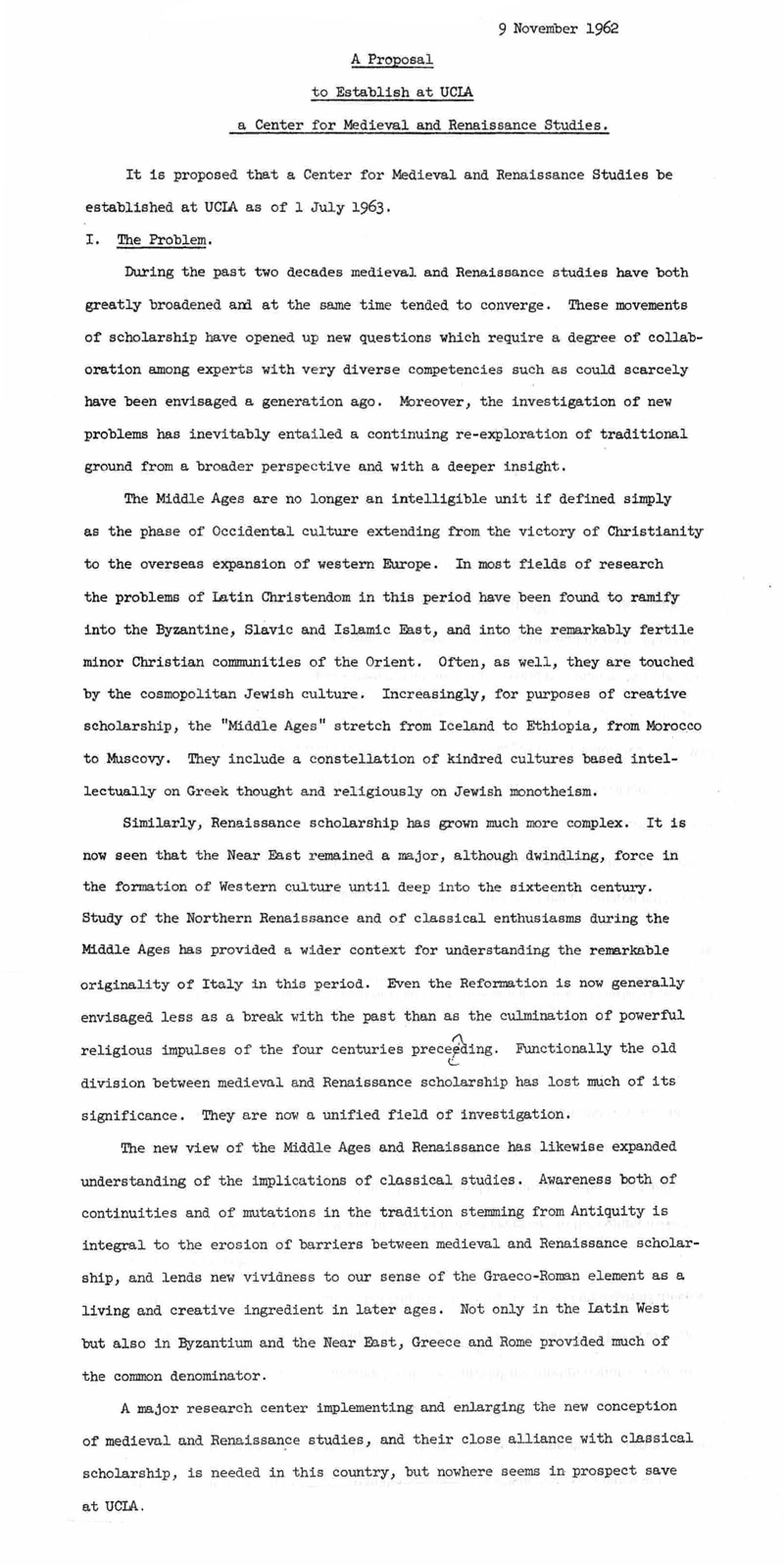About
Our Inquiry
UCLA’s CMRS Center for Early Global Studies promotes and sustains transdisciplinary studies of the periods from the 3rd to the 17th century CE across the globe. The Center’s mission is grounded in the disciplinary study of early periods and worlds (late antique, medieval, Renaissance, and early modern). Five main research axes structure the multifaceted inquiry of the Center’s diverse faculty: Sustainability-Repurposing, Fluidity-Permanence, Bodies-Performance, Conversion-Mobility, and Communication-Archive.
To counteract the varying periodizations across the globe, which do not fit neatly along European lines of division, the best term that accommodates the periods under the Center’s purview is “early.” The term “early” circumvents the problem of always centering periods in relation to modernity and thus avoids the pitfalls of teleology, of working on the presumption of progress from the past to the present. It is important to note that “early global studies” point to the study of unconnected and weakly connected worlds before globalization. In that sense, CMRS Center for Early Global Studies – through its institutional influence and its faculty’s teaching and research – champions a new understanding of “global studies” and promotes “studies” of the “early global.”
Our Goals
The Center has three primary goals:
- To stimulate and support the scholarship and research activities of its affiliated faculty, associates, students, and scholars;
- To foster and prepare the next generation of scholars and researchers by providing educational opportunities and financial, logistical, and other support; and,
- To create and disseminate knowledge, encourage intellectual exchange, and promote the study of the early global periods and worlds at the campus, local, regional, national, and global levels.
Our Outreach
CMRS-CEGS is dedicated to promoting research, teaching, and new methodologies in underrepresented and nontraditional areas of study and traditional fields and frameworks. It is guided by the conviction that without studying the past, the present and the future are inaccessible and opaque.
We support the research and teaching activities of 115 faculty members in more than twenty academic disciplines, offering approximately seventy-five undergraduate and graduate classes each quarter. We reflect and represent UCLA’s diverse faculty and graduate student body across various disciplines covering the breadth of the globe in the time periods under the Center’s purview. Academic fields of study have undergone significant changes in the last two decades that allow for comparative study of unconnected premodern and early worlds and connected early modern worlds across the globe. Moving away from traditionally European-identified fields of late antique, medieval, and Renaissance studies toward the coverage of the globe in a manner that is inclusive and methodologically sound is in line with UCLA’s strategic goals of social justice, its Rising to the Challenge initiative, and commitment to become a Hispanic-Serving Institution by 2025.
The Center offers fellowships, research assistantships, travel grants, and other support for graduate and undergraduate students. We sponsor numerous lectures, seminars, conferences, and workshops, host visiting scholars and researchers, and provide an open platform for exchanging methodologies and comparative study of the early worlds across campus and at a regional and national level. We administer and supervise externally funded grants.
Our publications include Viator, internationally recognized as one of the best scholarly journals in the field; Comitatus, one of the oldest academic journals for graduate students and early career researchers; and Cursor Mundi, a companion book series to Viator comprising single- and multi-author volumes. The Center also supports the publication of a variety of monographs and edited collections each year.
CMRS-CEGS does not award academic degrees, but it provides support for the development of relevant classes and funding for up to four undergraduate and graduate CMRS-CEGS seminars each year, administers the graduate certificate in Global Medieval Studies, assists students in identifying funding sources and educational opportunities in the field, and consults with faculty and departments on student recruitment strategies and support. The Center is active in its advocacy of campus faculty hires and mentoring of junior and mid-career faculty while also developing and maintaining sustained donor relations, all to further a broad global outreach among academicians and the public.
Our History
CMRS Center for Early Global Studies, an Organized Research Unit of the University of California, was founded in 1963 as the Center for Medieval and Renaissance Studies. Since September 2021, it has been called the CMRS Center for Early Global Studies or CMRS-CEGS. The original proposal by UCLA History Professor Lynn White Jr. established the foundational principles and continued focus that the Center’s current work expands upon. We hope to reinvigorate and honor Professor White’s scholarly outlook and intellectual scope as well as that of the other faculty who joined him in establishing the Center.
Lynn White Jr. argued for the establishment of CMRS in 1963 because
during the past two decades, medieval and Renaissance studies have considerably broadened and, at the same time, converged. These scholarship movements have opened up new questions requiring a degree of collaboration among experts with very diverse competencies, which could scarcely have been envisaged a generation ago.
CMRS-CEGS’s plans for the future align with his original assessment that
the Middle Ages are no longer an intelligible unit if defined simply as the phase of Occidental culture extending from the victory of Christianity to the overseas expansion of Western Europe,
a conception that he believed impacted equally the understanding of the Renaissance and antiquity:
Functionally, the old division between medieval and Renaissance scholarship has lost much of its significance. They are now a unified field of investigation. The new view of the Middle Ages and Renaissance has likewise expanded understanding of the implications of classical studies.
In a historical twist, as is often the case, present times imitate the gestures of the past.
Professor White’s scholarship, focusing on medieval technology, social change, religion, and the historical roots of the present ecological crisis, is enjoying renewed interest. For example:
- https://www.noemamag.com/the-conscious-universe/
- https://muse.jhu.edu/article/777619
- https://ecoevocommunity.nature.com/posts/14041-the-long-reach-of-lynn-white-jr-s-the-historical-roots-of-our-ecologic-crisis
- https://www.scu.edu/environmental-ethics/environmental-activists-heroes-and-martyrs/lynn-white.html
- https://conbio.onlinelibrary.wiley.com/doi/full/10.1111/cobi.12735

Faculty | Emeriti | Associates | Affiliates | Staff | MEMSA

